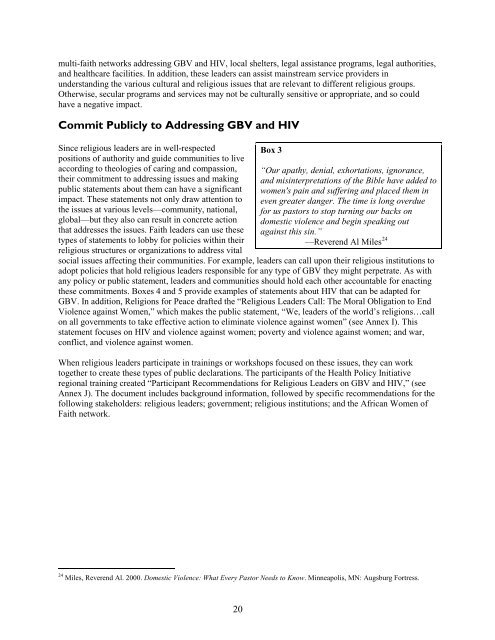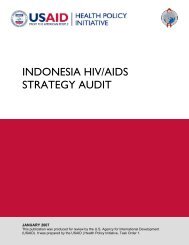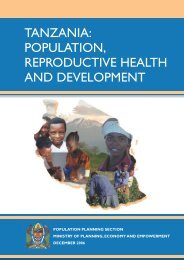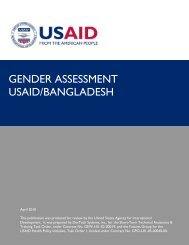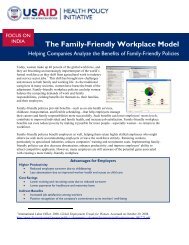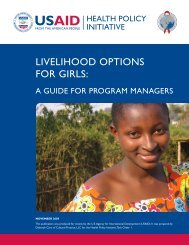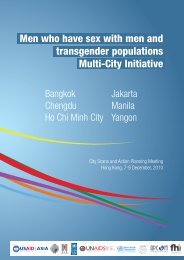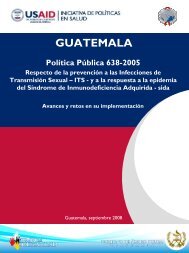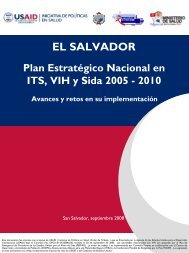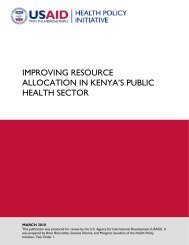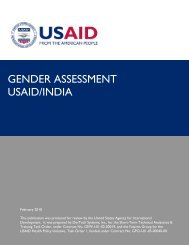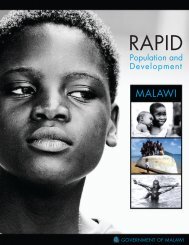A Call to Act - Health Policy Initiative
A Call to Act - Health Policy Initiative
A Call to Act - Health Policy Initiative
Create successful ePaper yourself
Turn your PDF publications into a flip-book with our unique Google optimized e-Paper software.
multi-faith networks addressing GBV and HIV, local shelters, legal assistance programs, legal authorities,<br />
and healthcare facilities. In addition, these leaders can assist mainstream service providers in<br />
understanding the various cultural and religious issues that are relevant <strong>to</strong> different religious groups.<br />
Otherwise, secular programs and services may not be culturally sensitive or appropriate, and so could<br />
have a negative impact.<br />
Commit Publicly <strong>to</strong> Addressing GBV and HIV<br />
Since religious leaders are in well-respected Box 3<br />
positions of authority and guide communities <strong>to</strong> live<br />
according <strong>to</strong> theologies of caring and compassion, “Our apathy, denial, exhortations, ignorance,<br />
their commitment <strong>to</strong> addressing issues and making and misinterpretations of the Bible have added <strong>to</strong><br />
public statements about them can have a significant women's pain and suffering and placed them in<br />
impact. These statements not only draw attention <strong>to</strong> even greater danger. The time is long overdue<br />
the issues at various levels—community, national, for us pas<strong>to</strong>rs <strong>to</strong> s<strong>to</strong>p turning our backs on<br />
global—but they also can result in concrete action domestic violence and begin speaking out<br />
that addresses the issues. Faith leaders can use these against this sin.”<br />
types of statements <strong>to</strong> lobby for policies within their —Reverend Al Miles 24<br />
religious structures or organizations <strong>to</strong> address vital<br />
social issues affecting their communities. For example, leaders can call upon their religious institutions <strong>to</strong><br />
adopt policies that hold religious leaders responsible for any type of GBV they might perpetrate. As with<br />
any policy or public statement, leaders and communities should hold each other accountable for enacting<br />
these commitments. Boxes 4 and 5 provide examples of statements about HIV that can be adapted for<br />
GBV. In addition, Religions for Peace drafted the “Religious Leaders <strong>Call</strong>: The Moral Obligation <strong>to</strong> End<br />
Violence against Women,” which makes the public statement, “We, leaders of the world’s religions…call<br />
on all governments <strong>to</strong> take effective action <strong>to</strong> eliminate violence against women” (see Annex I). This<br />
statement focuses on HIV and violence against women; poverty and violence against women; and war,<br />
conflict, and violence against women.<br />
When religious leaders participate in trainings or workshops focused on these issues, they can work<br />
<strong>to</strong>gether <strong>to</strong> create these types of public declarations. The participants of the <strong>Health</strong> <strong>Policy</strong> <strong>Initiative</strong><br />
regional training created “Participant Recommendations for Religious Leaders on GBV and HIV,” (see<br />
Annex J). The document includes background information, followed by specific recommendations for the<br />
following stakeholders: religious leaders; government; religious institutions; and the African Women of<br />
Faith network.<br />
24 Miles, Reverend Al. 2000. Domestic Violence: What Every Pas<strong>to</strong>r Needs <strong>to</strong> Know. Minneapolis, MN: Augsburg Fortress.<br />
20


